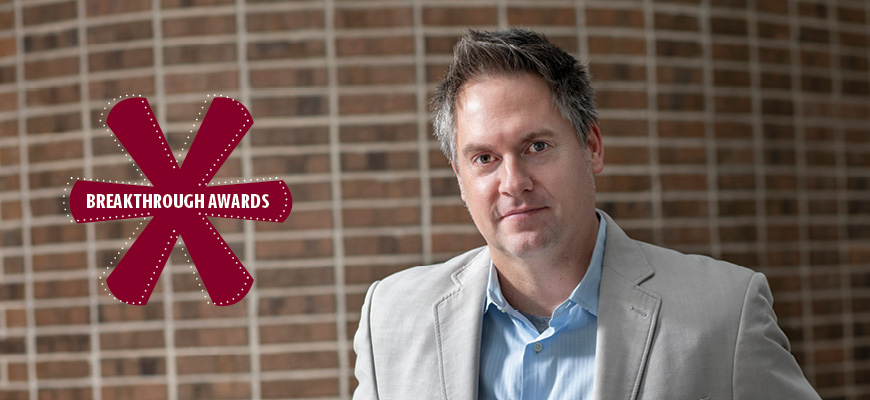
Breakthrough Star: Anthony Plotner
Education professor seeks to ease transition to adulthood for special education students
Posted on: September 15, 2020; Updated on: September 15, 2020
By Craig Brandhorst, craigb1@mailbox.sc.edu, 803-777-3681
Students with intellectual disabilities face an array of challenges as they navigate their way through high school. Some of the biggest challenges, though, are the ones these individuals face as they transition to a post-high school world, whether that means finding employment, securing community-based services or pursuing post-secondary education.
Anthony Plotner, an assistant professor of special education in the College of Education, is working to address all of the above — in practice and in his research.
“Providing secondary transition support is perceived as a bridge from the entitlement high school system to adult service system eligibility,” says Plotner. “We’re just trying to make sure that their transition from school to adult life is as seamless as possible. And there are a lot of moving parts to doing that.”
Since joining the College of Education in 2010, Plotner has pursued a robust research agenda, publishing more than 45 journal articles and several book chapters focused on improving life outcomes for students with diverse needs following high school. It’s a subject he knows firsthand.
Prior to entering the Ph.D. program at the University of Illinois, Plotner ran an intermediate care facility for adults with disabilities. It was during this time where he became more aware of the challenges facing this population. For example, many adults with disabilities were working and living in segregated settings. Much of his research focuses on improving adult life outcomes for youth and young adults with diverse needs.
We’re just trying to make sure that their transition from school to adult life is as seamless as possible. And there are a lot of moving parts to doing that.
Anthony Plotner, professor of special education
Plotner’s research is also building on his involvement with Carolina LIFE, a non-degree university program that gives students with intellectual disability a college experience — and prepares them, like any other college student, for the workforce.
“It’s one of several non-degree programs on campus,” says Plotner, the program’s director until 2019. “Employment is our primary outcome, but students also want to live as independently as possible, meet lifelong friends, become leaders and do all the other things people do in college.”
It’s a small program, accepting approximately six students per year, who live on campus, participate in campus events and take regular college courses alongside the rest of the student body. The results have been positive for both the CarolinaLIFE students and the UofSC community at large by promoting a more diverse study body, according to Plotner.
Most notably, Carolina LIFE students consistently attain jobs in their area of interest upon leaving the program. According to Plotner’s most recent data, 95 percent of students who have participated in the program are living independently and 85 percent are working in the community.
Plotner also has procured about $6 million in external funding, much of it to train pre-service teachers on how to best support transition-age youth with disabilities. He currently directs the graduate-level transition endorsement program, the only such program in the state.
Share this Story! Let friends in your social network know what you are reading about